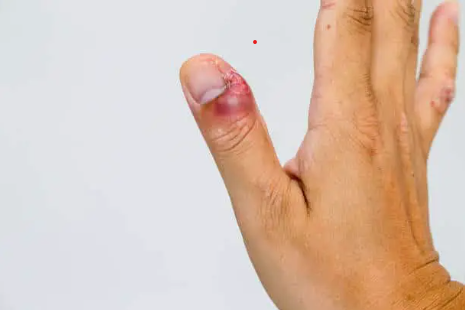Understanding Felons: Causes, Symptoms, and Treatments
Understanding Felons: Causes, Symptoms, and Treatments
- Alice Monroe
- May 13, 2025
- 0 Comments
- 2389 Views
Hello, Internet. I hope you're doing well. Today, we're going to talk about health, specifically about witches. I recently had one without really knowing how I managed to get it. I did some research and found out what had caused it. You might be surprised if I tell you that those who are most affected by this condition are those who often do manicures. Surprising. Don't worry; I'll explain it to you. But feel free to tell me what you use to deal with it in the comments.
I - Why should you care about felon symptoms?
The importance of understanding symptoms for early treatment
Why should you care about felon symptoms? The key to effectively managing these little troublemakers lies in early symptom recognition. Understanding the early signs of a felon not only helps alleviate discomfort quickly but also prevents the development of potential complications. We're talking about redness around the nail, a sensation of warmth, swelling, and even pus. These are not to be taken lightly, as they signal an ongoing infection. Early treatment, often with simple local care, can often resolve the issue before it becomes a real headache.
II - Explanation of different causes (bacteria, fungi, etc.)
Various pathogens can trigger felons, but bacteria are the most common culprits.
- Staphylococcus aureus, a bacterium on the skin, is often responsible for skin infections, including felons.
- Fungi, such as Candida, can also cause this condition, especially in individuals with weakened immune systems.
For those who enjoy nail care, during manicure sessions, removing cuticles, which are protective layers of the nails, can create a breach in the natural defense against bacteria. So, take note of these little details for better prevention and treatment of felons.
III-Felons Symptoms
The symptoms can be pretty varied. Picture redness and swelling around the nail, pain that can be quite intense, increased sensitivity to touch, and sometimes even a bit of pus. It's like your finger is sending out a distress signal! You might also feel a local warmth sensation, indicating an inflammatory response.
There's a difference between an acute felon and a chronic one. The acute felon is like a ninja; it comes quickly and forcefully, with intense pain and all the signs of a panicking infection. On the other hand, the chronic felon is more subtle; it can develop slowly, with persistent but less severe symptoms. It's important to make this distinction to choose the right course of action.
In summary symptoms can be quite varied:
- Redness and swelling around the nail.
- Intense and persistent pain.
- Increased sensitivity to touch.
- Possible presence of pus.
- Local warmth sensation, indicating an inflammatory response.
Now, there's a difference between an acute felon and a chronic one:
- Acute Felon: Manifests quickly with intense pain and all the signs of a panicking infection.
- Chronic Felon: Develops more slowly, with persistent but less severe symptoms. Making this distinction is essential to choose the right course of action.
IV- Risk Factors and Prevention
Now, let's talk about risk factors. You know, those little things that can make it more likely for you to end up with a felon. If you tend to injure yourself often around the nails, if you have the not-so-nice habit of biting your nails, if you have skin conditions like eczema, or if your job often exposes your hands to damp and not very clean conditions, well, you have a bit more chance of playing the felon roulette.
So, how to avoid this little trouble? Firstly, good hand hygiene is the ABC. Avoid biting your nails (easier said than done), protect your hands if you work in dirty conditions, and above all, don't let a little injury around the nail linger without attention. Treat it like a VIP, which will reduce your chances of playing the felon game.
In summary:
- Tendency to injure oneself often around the nails.
- Habit of biting the nails.
- Skin conditions like eczema.
- Frequent exposure of hands to damp and unclean conditions.
So, how to avoid this little trouble?
- Maintain good hand hygiene.
- Avoid biting your nails.
- Protect your hands in dirty conditions.
- Don't neglect minor injuries around the nail.
V- Treatment of Felons
Let's start with local home care. Yes, you heard it right; you can do a lot from the comfort of your home. Soaking your fingers in warm water with salt effectively relieves pain and reduces inflammation. Next, don't forget about antibiotic ointments to fight the infection. It's like a small defense army for your fingers!
But beware, if things don't improve, it's time to consult a healthcare professional. They'll know what to do and might even need to intervene to drain the pus. We don't joke about that, my friends!
In summary:
- Soaking fingers in warm water with salt to relieve pain.
- Antibiotic ointments to fight the infection.
- Medical consultation if symptoms persist.
- Medical intervention to drain pus if necessary.
VI- Tips for Recovery
How do you take care of the infected area during the healing process? Well, let's continue with soaking; it's not only effective but also relaxing. Keep the area clean and dry – that's the golden rule! If you're using bandages, change them regularly.
What should be avoided to speed up the healing process? Ah, that's important too! Avoid biting your nails; I know it's tempting, but resist the urge to nibble. And most importantly, don't exert too much pressure on the infected area; let it be so it can heal in peace.
In summary:
- Soaking for a relaxing recovery.
- Keeping the infected area clean and dry.
- Regular change of bandages.
- Avoiding nail-biting.
- Do not exert pressure on the infected area; let it heal peacefully.
VII- Essential Note:
Before we conclude, an important note. If you have any doubts or if symptoms persist, don't forget to consult a healthcare professional. Each case is unique, and specific advice can make a difference. Remember that this article is informative and in no way replaces a medical consultation. Take care of yourself and your fingers, and stay tuned for new health information!
So, that's the end of our discussion on felons. I hope you found this helpful information. Let's quickly recap what we've learned. Various pathogens can trigger felons, but bacteria, especially the notorious *Staphylococcus aureus*, are the main culprits. Fungi, skin injuries, and even manicure sessions can affect their development.
Early recognition of symptoms is crucial for effective treatment. Redness, swelling, intense pain, a sensation of warmth, and pus are warning signs not to be ignored. Remember, early treatment, often with local home care, can resolve the issue before it becomes more serious.

 | Unlock Success with Our Guide
| Unlock Success with Our Guide



0 Comments